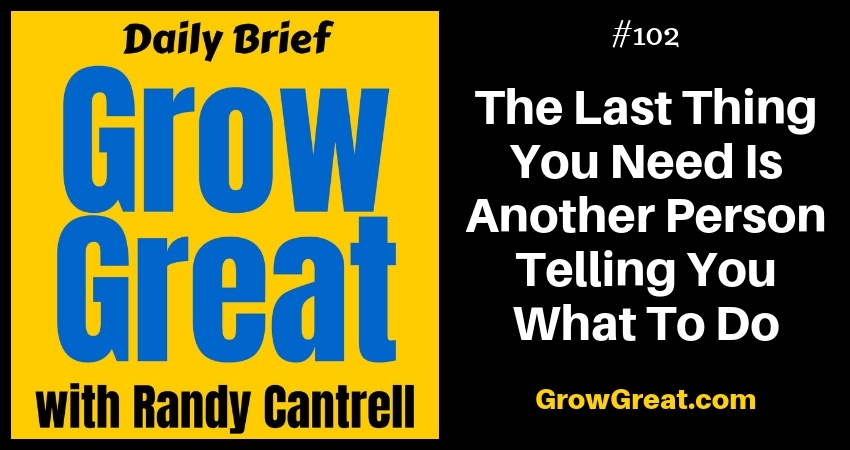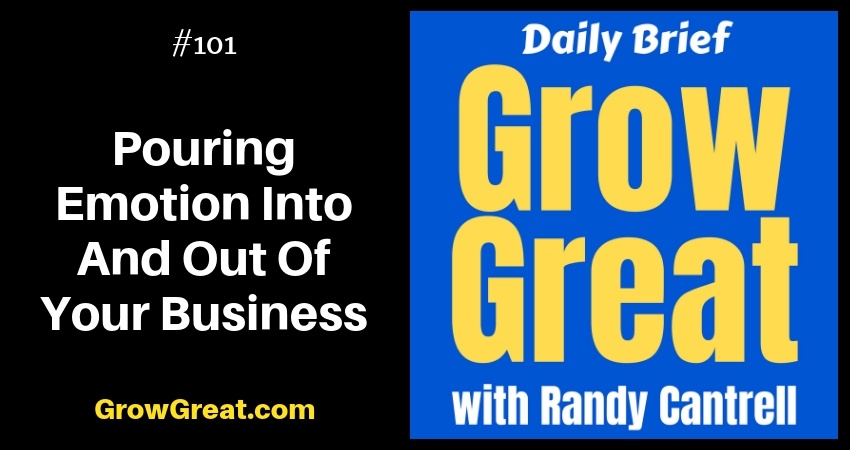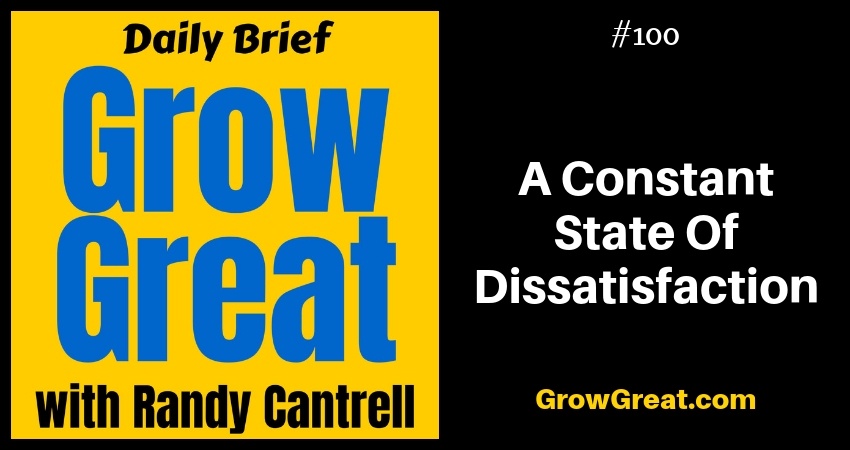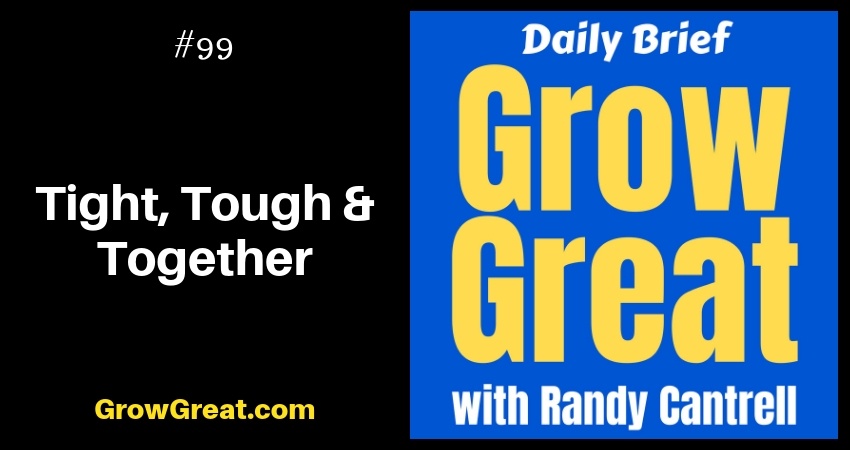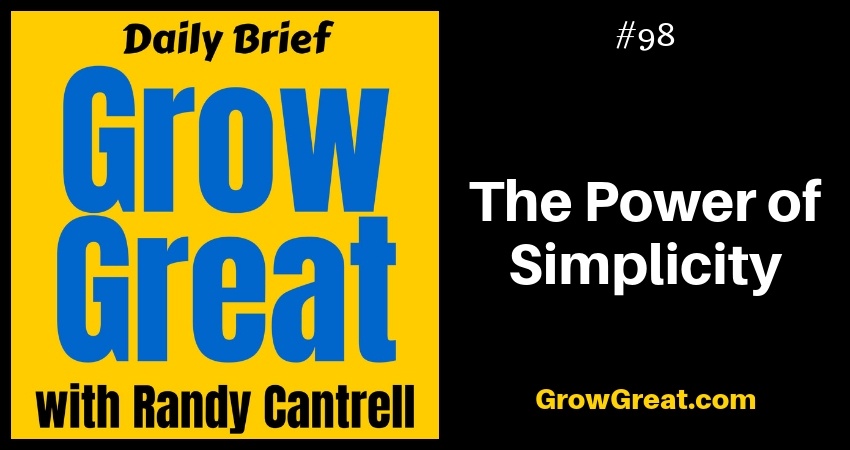The Last Thing You Need Is Another Person Telling You What To Do – Grow Great Daily Brief #102 – November 12, 2018
Podcast: Play in new window | Download (Duration: 11:54 — 11.4MB)
Subscribe: Apple Podcasts | Spotify | RSS | More
Happy Monday! This may be a short week for the podcast. I’ve got a hectic schedule starting Wednesday morning – through the rest of the week. But we’ll see how it goes. I’m just forwarning you so you don’t panic if you don’t hear from me after tomorrow. But for now, let’s kick this week off with a focus on what we DON’T need.
There are many things we don’t need, but perhaps the last thing we need…or the thing we most don’t need is another person telling us what to do.
Here’s the thing, and you hear me say it constantly…because it’s just true. You’ll figure it out. YOU will figure it out. Sometimes people think that means they have to go it alone, but that’s not it at all. Quite the contrary. We need the help of other people as we operate our business. We just need the right people. People who can help us figure it out, NOT people who try to figure it out for us!
Why are these the last people we need? Because they’re not helpful. They can be toxic.
Let me clarify. Sometimes we ask people, “What should I do?” And sometimes we really mean it. Other times, we don’t. We’re just looking for an easy answer.
Here’s the thing. Most people who are advice givers are prone to do it without context. They’re selfish. It’s not about you, but it’s about them. They’re smarter than you. Or think they are. But just because somebody gives us advice doesn’t make them a purebred advice giver.
Frequently, I’m asked, “What do you think I should do?” I can give advice as much as the next guy, but I need context before I’m willing to even consider doing it. That means I ask a ton of questions. My goal is to avoid “telling,” choosing rather to help the person see more clearly for themselves what they should.
Exceptions. There are always some. Harmful behavior. Illegal behavior. Unethical behavior. Immoral behavior.
Even these exceptions demand a bit of an explanation though. Not everybody wants or will accept advice when they’re behaving poorly. What do we do? I’m not a fan of looking the other way. To warn people that they’re going down a dangerous path isn’t the same thing as telling somebody what to do. We want to help people we care about, the people we love. None of want to sit idly by and watch people hurt themselves or others. Sometimes we need to intervene. This episode isn’t about how to go about that, but I don’t want any of us to feel bad for trying to extend that kind of help. And I don’t want us to hesitate thinking it’s the last thing these people need. No, they need somebody courageous enough to help them and warn them. We all need correction sometimes.
It’s hard enough for us to change ourselves. It’s impossible for us to change anybody else, but it’s possible for us to help them see their need to change. So when we’re faced with friends or family or coworkers who are behaving poorly…I think we have a responsibility to serve them well. They have to decide for themselves. As we all do.
Okay, back to the point of today’s episode – which basically is the truth that we all have to figure it out, but others can help us do that better and faster!
Giving advice.
Every leader does it. We should. But that isn’t necessarily (or always) the same as telling people what to do. But sometimes it is.
You’ve got an employee who isn’t cutting it. Their job is now on the line. If they don’t improve, they’ll most certainly be terminated. Should you tell them what to do to improve so they can keep their job? Absolutely! You owe it to them. Further, you owe them candor – sincere honesty. Be as clear as you possibly can because the stakes are high. Your position of leadership gives you a perspective where you know exactly what improvements must be made. Tell them. Just remember, it’s up to them to do it. You’ll have to hold them accountable for the decision they make, but it’s their responsibility to accept or reject your advice.
As leaders, we have to read every situation for what it really is. That employee at risk of losing their job is not the same as one of our direct reports coming to us for advice about a particular problem they’re facing. Suppose a VP comes to you one morning wondering what she should do about some business challenge. You may be tempted to dive directly into advice giver mode. Resist. Instead, assume the role of mentor and coach. Take aim at helping this VP figure it out for herself. Ask questions. Ask the VP how she feels about the answers she’s giving or the questions you’re asking. Be a trusted sounding board for her.
Autocratic and tyrannical leaders will use such sessions to exert their power. For them, the hierarchy is the only thing that matters. Mostly, that everybody realizes they’re at the top of that hierarchy. But those leaders aren’t listening to me! 😀
You want to grow as an evidence-based leader. Evidence-based leaders resist the urge to jump to conclusions or assumptions that have no basis. Practice digging a bit to better understand the situation and the context. By doing that, you’ll be demonstrating to others how they can also incorporate that behavior into their own leadership. It’s the solid path toward growth and improvement.
Taking advice. Or resisting it.
As I said earlier, some people are just quick to say, “Well, I’ll tell you what you should do!” Since we’re talking about refraining from telling people what to do I’m going to break the rule by urging you to limit your interactions with these people as much as possible. Their judgment and constant advice giving just isn’t helpful. They’re not helping you grow or learn anything. They’re selfish and using you as a platform for there self-perceived brilliance. I’m not a fan of giving people like that any extra oxygen. Do as you please.
We embrace what we own.
If I decide I’m going to drop 20 pounds, I’m more likely to accomplish that feat. If you ride me about how I need to lose weight and you’re constantly telling me why I should do it – even if your reasoning and logic are spot on – I’m not likely going to lean into that decision because I don’t own it. And your nagging me may compel me to reject it, even though I know it’s best for me. Proof that we’re not always (sometimes, not even often) logical.
Instead, you could share with me a story about your own journey. Not in some narcissistic way to make sure the spotlight is always on you, but in a way to show your own vulnerabilities. You might tell me about going to the doctor earlier in the year and discovering that some of your numbers were elevated. Blood pressure, blood sugar, bad cholesterol, etc. So the doctor pushed you to drop some weight. You signed up at a local gym and began going twice a week. Within a month you were going 3 times a week. Now, more often than not you go 4 times a week. You dropped 25 pounds, stopped snoring and feel better than you’ve felt in years. Oh, and those elevated numbers are all down well within the healthy range. As you’re sharing this with me I’m thinking of myself. And likely telling myself, “You should do this.”
Hearing you extol the benefits and sharing the details of how you altered your diet, along with reasonable exercise – not marathon gym sessions – I’m thinking what may be possible for me. I won’t think that way if you’re harping at me, or telling me what to do.
Here’s the big elephant in the room. CEOs and entrepreneurs are very independent. We don’t enjoy being told what to do. By anybody. Especially when we didn’t ask for it.
But we’re lifelong learners who enjoy being pushed. We love the competition. Especially with ourselves.
Questions help us. We need people in our lives willing to ask us tough questions. Not to embarrass us or put us on the spot, but to make us defend our actions, behaviors and choices. Those compassionate challenging questions provoke us to stretch, learn and grow. In short, they help us figure it out.
Learn how to do it for others. Learn how to do it for yourself.
Be well. Do good. Grow great!

